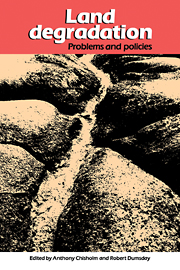Book contents
- Frontmatter
- Foreword
- Contents
- The Contributors
- Figures
- Tables
- Glossary
- Preface
- Land degradation and government
- I Physical and biological aspects of land degradation
- II Social costs
- III Legal, institutional and sociological factors
- 7 Land degradation: legal issues and institutional constraints
- 8 Land tenure: plaything of governments or an effective instrument?
- 9 Social bases of farmers' responses to land degradation
- IV Behavioural causes, economic issues and policy instruments
- V Pressure groups, public agencies and policy formulation
- VI Towards more effective policies for controlling land degradation: an overview
- A Rational approaches to environmental issues by Anthony Chisholm
- B Comments by Bruce Davidson
- C Comments by John Thomas
- D Participants at workshop on land degradation and public policy
- Bibliography
- Index
8 - Land tenure: plaything of governments or an effective instrument?
Published online by Cambridge University Press: 05 February 2012
- Frontmatter
- Foreword
- Contents
- The Contributors
- Figures
- Tables
- Glossary
- Preface
- Land degradation and government
- I Physical and biological aspects of land degradation
- II Social costs
- III Legal, institutional and sociological factors
- 7 Land degradation: legal issues and institutional constraints
- 8 Land tenure: plaything of governments or an effective instrument?
- 9 Social bases of farmers' responses to land degradation
- IV Behavioural causes, economic issues and policy instruments
- V Pressure groups, public agencies and policy formulation
- VI Towards more effective policies for controlling land degradation: an overview
- A Rational approaches to environmental issues by Anthony Chisholm
- B Comments by Bruce Davidson
- C Comments by John Thomas
- D Participants at workshop on land degradation and public policy
- Bibliography
- Index
Summary
Introduction
The first land use policies to be used by Europeans in Australia were based on the tenure system. Settlement began with leases, licences and the issue of grants of land to people as rewards for achieving certain goals. The feature which differentiates land tenure from most other systems which seek to influence land use is that it mixes incentives, rewards and penalties all into one. Moreover, the system is specific in the way it issues and withholds property rights. Most other systems work solely by withholding property rights. But, as most rights to use land have already been issued in the form of a freehold title to a landholder, the option to return to a land tenure system to control land use throughout Australia's productive lands has largely been forgone. No government is likely to exercise its powers of eminent domain and legislate to acquire and/or resume all these freehold titles and reintroduce a tenure-based land use control system. Throughout most of the less productive rangelands of Australia, however, this opportunity remains.
Recent developments
Earlier this century a cynical NSW politician bemoaned the fact that the Western Lands Act, which establishes the tenure system for the control of grazing in western New South Wales, had become ‘the plaything of governments’ (King 1957 pl63). Since 1979 there have been inquiries into pastoral land management in Western Australia (‘Jennings Report’, Western Australia 1979); pastoral land tenure in the Northern Territory (‘Martin Report’, Northern Territory 1980); pastoral land administration management and tenure in South Australia (‘Vickery Report’, South Australia 1981) and the Western Division of New South Wales (four reports New South Wales 1983, 1984a,b,c).
- Type
- Chapter
- Information
- Land DegradationProblems and Policies, pp. 175 - 186Publisher: Cambridge University PressPrint publication year: 1988
- 1
- Cited by



